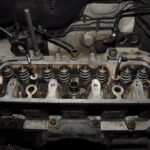6 Reasons Why Your Car Fan is Loud [Solved]
Loud car fans are annoying. They are not just deafening and distracting, noises from the radiator also mean it is not functioning properly, which is an important function to keep your engine temps in control. So fixing it takes priority.
But what gets the fan squeaky in the first place? Well, here are 6 reasons why your car fan is loud and their solution.
Why is Your Car Fan so Loud?
A car fan is so loud, probably because of broken fan blades, worn-out bearing, or a misaligned radiator fan.
Just like any fan, radiator fans dissipate heat by constantly rotating in one place. You have old radiator fans that work on belts and recent ones that are motorized. Both of which can go bad due to simple wear and tear, causing it to make squeaky noises.
Reason 1: Broken Fan Blades
Radiator fans are generally made of aluminum and steel. But some vehicles also have fans made with thermoset plastic. While these fans are not affected by heat, they tend to break. The broken fan blade can get caught in-between, continuously hitting the other parts. A broken fan would also have unstable rotation causing weird noises.
In the case of metal radiator fans, while they can’t break, they can still bend, hitting other parts around them. Recent physical damage or misalignment is a good enough reason to cause that. If you have a constant rattling sound from your radiator, there is a good chance that the fan blade is broken.
Also read: 10 Car Brands with the Cheapest Parts (Exact Costs)
Reason 2: Worn-Out Radiator Fan Bearing
Worn-out fan bearings are the most common reason for fan noises in motorized radiator fans. The bearings are inside the motor that helps the fan rotate freely while the motor is fixed. These bearings are made to last for 8-10 years, but they get worn out due to overuse or over-time.
The worn-out bearing not only causes unstable rotation, but the friction inside the motor is also increased. Lack of lubricant over time also makes the process rough, which causes the fan to make squeaky noises.
Reason 3: Misaligned Radiator Fan
Misalignment of radiator fans is not that often, but it does happen in a lot of cases. This misalignment causes the fan to roll around, possibly hitting the wall or the frame. A misalignment can be caused due to failed bearings or the melting of the plastic parts due to overheating.
Due to misalignment, the fan would hit the sidewalls and break, sabotaging the whole cooling system. Or the broken fan would have unstable rotation forcing its motor to misalign. All of which is one big loop, with one problem creating another.
Read it: 10 Car Brands with the Cheapest Parts (Exact Costs)
Reason 4: Engine Overheating
The obvious reason for a bad radiator is engine overheating. If your engine is overheating over and over again, then the cooling system has failed. There is a good chance that the radiator fan is not running at all.
To check, just turn on the engine and let it idle for a bit. If the fan turns on, the problem might be with the coolant level. Otherwise, you might have a blown fuse.
Reason 5: Blown Fuse
Motorized radiator fans have a fuse to ensure the safety of the system at times of surge. If your vehicle has recently experienced an electric surge, the fuse would blow itself, cutting the connection between the fan and the battery. In such a case, the fan would not run until the fuse is fixed.
Trending Video: How to Easily Bring Back to Life any Old Car Battery and Save Tons of Money (click to watch)
Reason 6: Bad Air Conditioning
Bad air-con cooling is another symptom of a bad radiator. The radiator, apart from cooling the coolant, also pulls the air through the condenser and dissipates heat from the refrigerant. If the radiator stops working properly, the refrigerant won’t cool as well, and the air-con will blow hot air rather than cold.
How Much Does a Mechanic Charge to Fix This Problem?
The reason behind a noisy fan can be all or any of the three reasons mentioned above. And the fixes are pretty direct as well. However, the prices vary depending on the problem and how you get them fixed.
For a broken radiator fan, the average replacement cost is between $500-$600. This includes the labor cost.
While the fans aren’t especially costly, their positioning makes them hard to access. Usually, it takes around 2-3 hours to replace a radiator fan. With the labor cost at around $130-$150, the price greatly depends on the replacement part.
A fan is around $50-$100, depending on the make. If you have a motorized fan, the motor is around $50-$80 as well. For a misaligned fan, recentring needs physical labor, which depends on the hourly rate. The cost of repair can vary if you have other broken or melted parts as well.
Given that nothing else goes wrong and a mechanic is doing the repairs. A broken fan blade would cost you around $150, replacing a fan motor bearing $100, and fixing fan misalignment for $100 as well. You can save greatly on such expenses by doing the repairs yourself.
Read it: Buying a German Car: 5 Pros and 2 Cons
Can You Drive with a Loud Car Fan?
If you are fine with the noises, then yes, you can drive your car with a loud car fan. The engine doesn’t need the radiator to operate. So even if your radiator is malfunctioning, the car will run fine. If you live in cold areas with avg temp below 59 degrees Fahrenheit, you wouldn’t need the radiator fan anyways.
However, if your area has temps at or above 77 degrees Fahrenheit, then driving with a malfunctioning radiator fan would lead to a host of problems.
What Happens if I Don’t Get My Radiator Fan Fixed?
A broken or malfunctioning radiator fan can’t optimally cool the engine, which can lead to engine overheating.
A radiator fan’s job is to dissipate heat. While the engine is operating continuously, it gets incredibly hot in the engine bay. So when you are driving, the passing air goes through the grille and helps cool down the engine.
But when at stops or in traffic, when there is no opposite air, the temps rise at an incredible pace. The radiator fan then turns on to blow the air inside the engine bay. It not only dissipates the heat but also cools down the coolant. Which in return cools down the engine.
So if the radiator fan malfunctions, say it’s broken or misaligned and can’t work at optimum efficiency, it will lead to engine overheating. While it won’t be major at first, you won’t be able to notice it until the engine lights are on. Ignore the warning lights, and you would have a hood full of white smoke.
Overheating of the engine can also lead to seizing of the engine, cracked engine blocks, overflow of oil and coolant, and potential engine fire.


![7 Probable Reasons of Slow Car Acceleration [+Solution]](https://yourgreatcar.com/wp-content/uploads/2021/08/asd-min-150x150.jpg)



